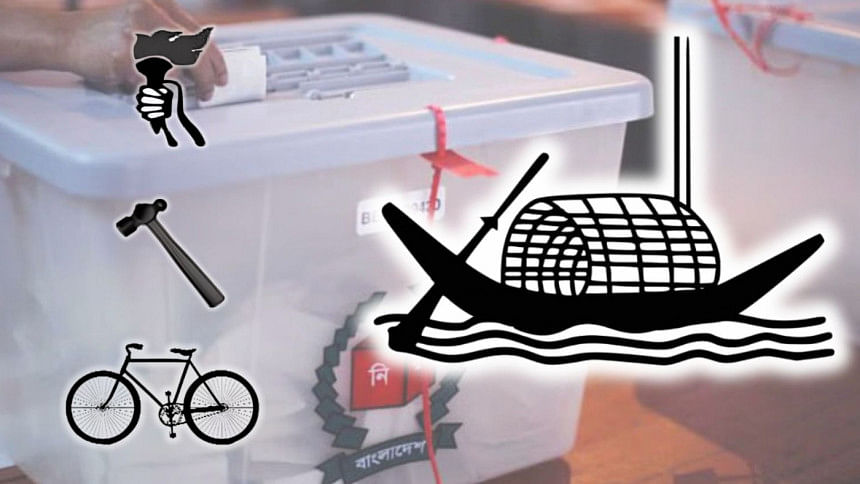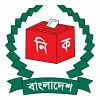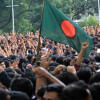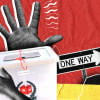What is seat-sharing and why as a voter you should know about it

In the lead-up to the national election on January 7, 2024, parties that have committed to participating in the polls have put forth their nominees.
The Election Commission's scrutiny of nominees is underway, and as the deadline for withdrawal of nomination forms on December 17 draws near, talk has shifted to seat sharing between political parties.
But what is seat-sharing? How does it affect the upcoming elections and the possible shape of the 12th national parliament?
Generally speaking, seat sharing is done between the members of a political alliance to maximise their representation within an elected body. In a Bangladeshi context, especially in recent elections, party alliances engage in seat-sharing negotiations to allow alliance members to run under the electoral symbol of the largest party within the alliance.
For example, as Awami League (AL) and Jatiya Samajtantrik Dal (JSD) are part of the same alliance, AL may agree to share a constituency with JSD by withdrawing the AL candidate there, and allowing a JSD leader to run under the "boat" symbol.
In the case of the 2018 polls as well as the upcoming national polls, the scenario mainly features AL sharing seats with the smaller parties it is allied with, allowing leaders like Hasanul Huq Inu of JSD and Rashed Khan Menon of Workers Party of Bangladesh to run under the "boat" symbol.
Other parties whose leaders ran under the "boat" symbol in 2018 are Bikalpa Dhara Bangladesh, and Bangladesh Tarikat Federation. All of the parties mentioned above are part of the AL-led electoral alliance.
Alternatively, under a seat-sharing agreement, a major party like Awami League may choose to withdraw their own candidate for a particular constituency and have the candidate of an alliance member running with their own party symbol.
Such was the case with Anwar Hossain Manju, the candidate from Jatiya Party (Manju) running in Pirojpur-2 in 2018 under the "bicycle" symbol, where no candidate ran under the "boat" symbol. Importantly, he still remained part of the AL-led alliance.
In 2018, Awami League did not field candidates in 26 constituencies where Jatiya Party (Ershad) ran candidates. In those seats, JP (Ershad) candidates ran under the "plough" symbol.
Right now, machinations are ongoing to negotiate agreements for the national polls similar to the ones that were in place in 2018. Members of the AL-led alliance want a larger share of the seats by running under the "boat" symbol, while reports say that Jatiya Party (Ershad) are looking for a scenario much like 2018, where AL does not field candidates in some of the seats where JP (Ershad) candidates are running.
There is a complication that wasn't present last time, however, as AL have already nominated candidates in 298 seats, whereas in 2018, they nominated candidates in 230 seats. Add on top of that the fact that "AL independent" candidates are also being allowed to contest elections by the ruling party, so smaller alliance members will have their work cut out.
So, what does all of this mean for the voters and the outcome of the election? Quite a lot, if the numbers from 2018 are anything to go by.
In 2018, Workers Party of Bangladesh fielded three candidates with its "hammer" symbol, and they received 1,729 votes. The five candidates who ran with "boat" received 6,44,335 votes.
For JSD, the nine candidates with its own "torch" symbol received 39,104 votes. The three candidates who ran with "boat" received 5,70,940 votes.
Bikalpa Dhara Bangladesh's 23 candidates with the "winnowing fan" symbol mustered 18,183 votes, and the three candidates with "boat" received 5,47,757 votes.
Finally, for Bangladesh Tarikat Federation, the two candidates who ran under the "boat" symbol accumulated 4,23,868 votes; the 16 who didn't amassed 6,087 votes.
As for JP (Ershad), they won 21 of the 26 seats in 2018 where they contested with no AL candidate running for election. In the 145 seats where both AL and JP (Ershad) contestants ran, every JP (Ershad) contestant lost their security deposit.

 For all latest news, follow The Daily Star's Google News channel.
For all latest news, follow The Daily Star's Google News channel. 








Comments